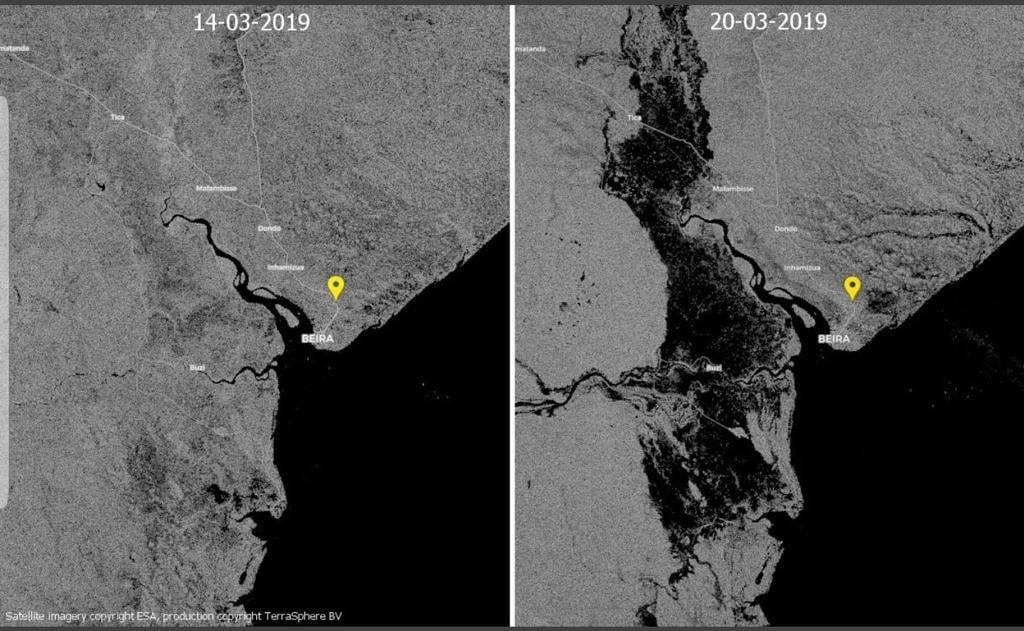Last week, Cyclone Idai battered parts of southern Africa, leaving flooding and destruction across much of Mozambique as well as parts of Malawi, Madagascar, South Africa, and Zimbabwe. Although the cyclone has dissipated, severe flooding persists, especially around the port city of Beira, Mozambique, and the full impact of the storm is yet unknown, with many villages still inaccessible. As of March 20, the Anglican Communion News Service reported that the death toll had risen to 432, with more than half of those deaths in Mozambique alone. The death toll is expected to top 1,000.
In a statement to the Anglican Communion News Service, the Most Rev. Thabo Makgoba, the Archbishop of Cape Town and Primate of the Anglican Church in Southern Africa, which includes Mozambique and South Africa, emphasized the need for prayers for those affected by the disaster and urged those who are able to donate to the Province of Southern Africa’s disaster relief fund.
Although Mozambique is on the other side of the globe, connections run deep in the Episcopal Church. The Rt. Rev. Mark Van Koevering, Bishop Provisional of the Diocese of Lexington, was Bishop of Niassa in Mozambique from 2003-2015 before returning to the United States where he served as Assistant Bishop in the Diocese of West Virginia before moving to Lexington. Bishop Van Koevering is married to the Rev. Canon Dr. Helen Van Koevering, who served as a priest in the Diocese of Niassa and also worked developing curriculum for children, youth, and families in Niassa; she is currently the rector of St. Raphael’s Episcopal Church in Lexington.
In communications with Episcopal Café, the Van Koeverings each reflected on the seriousness of this disaster. In emails with the Café, Canon Van Koevering noted that the effects of rural geography and rough terrain as well as climate change and chronic poverty make the people of Mozambique, ranked one of the poorest nations in the world, particularly vulnerable in the face of natural disasters. Furthermore, Mozambique is still in the midst of its rainy season, which will compound the effects of flooding and slow down relief efforts.
Bishop Van Koevering echoed and elaborated on these sentiments in a phone call with the Café, stating,
“People live such precarious lives already and there’s very little safety net so when something like this happens, the level of destruction is so much worse than it is for us here. People are living on the edge. Five days later, people are still living on rooftops waiting to be rescued.”
He acknowledged that death tolls are predicted to top 1,000 but that final numbers could potentially be much higher, particularly due to water-borne illnesses. He stated that communications he’s received from friends and organizations on the ground indicate that more than 200,000 families have been impacted by the cyclone.
Bishop Van Koevering also expressed concern about the increasing frequency of events like this happening as climate change progresses; this current disaster is considered to be the worst flood ever to hit that area but there have been several other major floods in recent years, each time having a disproportionate impact on society’s most vulnerable. He explained saying,
“When you look at environmental footprint, Mozambique is like a little toe and those of us here in the North are like hundreds and hundreds of feet. Our lifestyle is provoking this change, not those suffering.”
Despite the massive destruction and flooding around parts of Mozambique and in surrounding areas, this is an exciting time for the Anglican Church in Mozambique. After more than a decade of rapid growth, the Diocese of Niassa, the northern of the two dioceses in Mozambique where the Van Koeverings served, decided last fall to split itself into two dioceses, making three total dioceses in the country. The New Missionary Diocese of Nampula was officially inaugurated last Saturday, March 16, just as the country was reeling from Cyclone Idai, although that part of the country escaped major damage.
Even in the face of the hardships being experienced by the people of Mozambique and surrounding areas, Rachel Carnegie, the executive director of The Anglican Alliance, which serves to connect relief and development organizations from around the Anglican Communion including Episcopal Relief and Development, told the Anglican Communion News Service that local churches and dioceses are jumping in where they can to help those in need, saying,
“It is inspiring to hear how the local dioceses and Mothers’ Union are already mobilising support for the communities impacted by this devastating cyclone…The Anglican Alliance stands ready to liaise with the dioceses on the ground and the wider Anglican Communion in their response to this disaster.”
Here in the United States, Episcopal Relief and Development is partnering with the Dioceses Niassa and Lebombo in Mozambique as well as Anglican relief organizations in Zimbabwe and Malawi.
The Diocese of Lexington is also collecting donations for relief efforts in Mozambique and surrounding areas after many people who know of the Van Koeverings’ connections there asked how they could help. The diocese will then send the money it collects through one of the established relief agencies.
The header image is a satellite image that was shared by Canon Van Koevering on Facebook and shows side-by-side images from March 14, before flooding, (left) and March 20, during flooding, (right).

